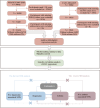Association between depression and asthma: insight from observational and genetic evidence
- PMID: 40796827
- PMCID: PMC12341131
- DOI: 10.1186/s12888-025-07245-w
Association between depression and asthma: insight from observational and genetic evidence
Abstract
Background: Depression and asthma share several pathophysiologic risk factors, and their precise connection remains unclear. Our research seeks to assess the relationship between depression and asthma.
Methods: The association between depression and asthma was assessed through a multivariable logistic regression analysis, with data sourced from The National Health and Nutrition Examination Survey (NHANES) 2007-2018 and the English Longitudinal Study of Ageing (ELSA) 2004-2019. Subsequently, a linkage disequilibrium score regression (LDSC) analysis was conducted to evaluate the genetic correlation between depression and asthma. Moreover, a two-sample Mendelian randomization (MR) analysis was conducted by employing genome-wide association study (GWAS) summary statistics by means of both univariable MR (UVMR) and multivariable MR (MVMR).
Results: This study included 31,434 participants from NHANES and 17,021 participants from ELSA for observational research. In the unadjusted model, participants with depression had a significantly increased risk of asthma in comparison to participants without depression, both in NHANES (OR = 2.002, 95%CI: 1.827-2.193, P < 0.001) and in ELSA (OR = 1.753, 95%CI: 1.581-1.943, P < 0.001). After adjusting potential confounders, the results remain significant. The LDSC result revealed a significant positive genetic correlation between depression and asthma (rg = 0.352, P < 0.001).The UVMR results further substantiated a genetically predicted causality of depression on asthma (OR = 1.291, 95%CI: 1.157-1.442, P < 0.001), while the reverse causality does not stand. Similar findings from MVMR were obtained for the causality investigation after adjusting smoking (OR = 1.326, 95%CI: 1.156-1.520, P < 0.001), drinking (OR = 1.375, 95%CI: 1.186-1.593, P < 0.001), and education (OR = 1.425, 95%CI: 1.253-1.621, P < 0.001).
Conclusion: Our findings indicate that depression may play a contributory role in the development of asthma, underscoring the potential benefit of implementing prevention strategies aimed at managing depression to mitigate asthma risk.
Keywords: Asthma; Causal relationship; Depression; Mendelian Randomization; Observational study.
© 2025. The Author(s).
Conflict of interest statement
Declarations. Ethics approval and consent to participate: The NHANES protocol has received approval from the NCHS Ethics Review Committee. The ELSA study was approved by the London Multicenter Research Ethics Committee (MREC/01/2/91). All participants provided informed consent. The GWAS data was publicly available and ethics approval and informed consent were not required. Consent for publication: Not applicable. Competing interests: The authors declare no competing interests.
Figures




References
-
- National Asthma Education and Prevention Program. Expert panel report 3 (EPR-3): guidelines for the diagnosis and management of Asthma-Summary report 2007. J Allergy Clin Immunol. 2007;120(5 Suppl):S94–138. - PubMed
-
- Ellwood P, Asher MI, Billo NE, Bissell K, Chiang C-Y, Ellwood EM, et al. The global asthma network rationale and methods for phase i global surveillance: prevalence, severity, management and risk factors. Eur Respir J. 2017;49:1601605. - PubMed
-
- Smith K. Mental health: a world of depression. Nature. 2014;515:181. - PubMed
Publication types
MeSH terms
Grants and funding
LinkOut - more resources
Full Text Sources
Medical

